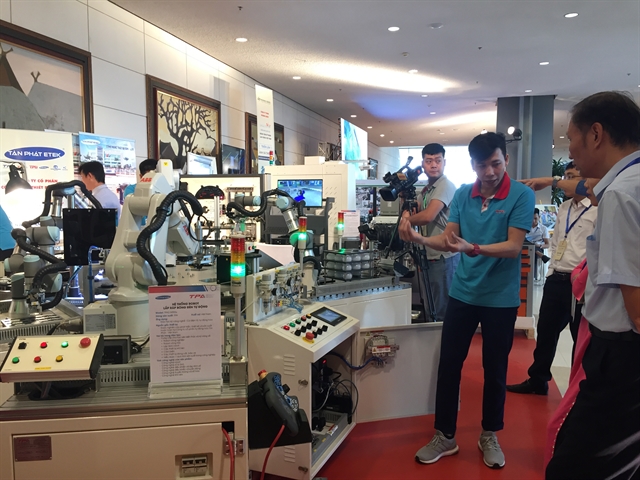 Society
Society


|
| A staff of Tân Phát Etek Company explains the operation of their automobile repair facilities for delegates in the exhibition under the framework of Skilling up Việt Nam. — VNS Photo Khoa Thư |
HÀ NỘI — Việt Nam has to pay more attention to improve quality of its vocational training system to efficiently promote labourers’ skills.
That was the message from Prime Minister Nguyễn Xuân Phúc speaking at the country’s largest-ever forum on vocational training in Hà Nội on Saturday.
“Capacity building for vocational education is a global issue, especially in developing countries like Việt Nam,” Phúc told guests at 'Skilling up Việt Nam'.
He also repeated his recent statement at the National Assembly’s session, saying the country’s major engine for development was human capital of nearly 100 million Vietnamese people, not natural resources.
“Labour skills, management skills, intellectual capacity and professional capacity of each citizen are determinants for the nation’s growth,” he added.
According to Phúc, over the last 30 years, the expansion of population and workforce has contributed to stimulating GDP growth.
But since 2013, the size of Việt Nam’s labour force has showed signs to approach its limit in comparison with the economy’s size. Raising productivity has been set as the main mission to boost and restructure the national economy.
“Expanding the scale and improving the quality of vocational training plays important roles in creating skilled human resources and increasing productivity,” he said.
“The participation of enterprises is essential to align curricula with the economy’s demands.”
Although Việt Nam has the third largest population in ASEAN, following Indonesia and the Philippines, its percentage of trained workers is slightly above 25 per cent, equivalent to one-third of the rates in South Korea, Taiwan (China) or Singapore. The figure can reach 50 per cent like in many other countries.
The PM added: “Only when vocational training in Việt Nam can catch up with the level in developed countries, can it move up in global value chains.”
Phúc also asked Ministry of Labour, Invalids and Social Affairs (MOLISA) to compose a social agreement among schools, businesses and the Government in vocational training to create highly skilled human resources.
Minister of Labour, Invalids and Social Affairs Đào Ngọc Dung said in the next ten to 15 years, one-third of current jobs will be changed under the impact of the Fourth Industrial Revolution, information technology, robot, automation and artificial intelligence.
Some 40 per cent of workers worldwide will lack skills necessary for their jobs when robots replace human.
“It is an urgent task to create changes, especially in labour intensive industries such as textile, garment, footwear and electronics,” said Dung.
Deputy Prime Minister Vũ Đức Đam pointed out three solutions to improve quality of vocational education including receiving latest technology from foreign countries, accelerating autonomy and enhancing the tie of businesses and schools.
Trương Gia Bình, chairman of FPT – Việt Nam’s largest information technology company, cited a report saying in every four workers, there are three people who might lose jobs because of outdated skills.
He recommended promoting digital literacy to help all Vietnamese people approach innovations, acquire a digital mindset and apply automation in their work.
Việt Nam has identified some 130 jobs which are important for the country’s growth, certified 40 high-quality vocational training schools and recorded the employment rate of 85 per cent among these schools’ graduates.
'Skilling up Việt Nam' is the first national forum on labourers’ skills and vocational education co-hosted by MOLISA, Ministry of Planning and Investment, Ministry of Industry and Trade, and Việt Nam Chamber of Commerce and Industry (VCCI).
The two-day event on Friday and Saturday gathered some 1,500 participants including policymakers, researchers, businesses and workers in diverse panel discussions and exhibitions. — VNS




